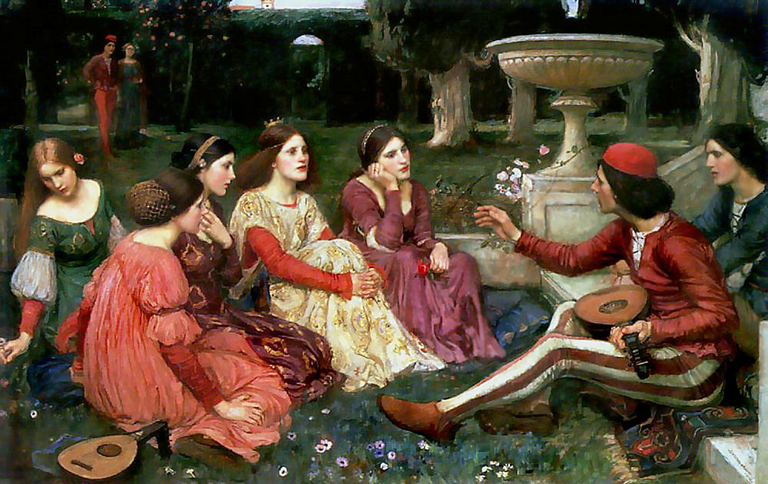

Giovanni Boccaccio is a 14th century italian writer. His magnum opus ‘The Decameron’ first appeared on my radar when I was looking for major literary works of the renaissance period. I saw it a second time in a goodreads group specialized in classical text. The book description stole my attention right away and before long, I was on a journey to plague infested 14th century Italy.
Boccacio wrote the book right after the plague ended. In his words—it was to give comfort to the people, specially women. It took him a few years to finish it.
Synopsis
The black death devastated many civilizations, utterly destroyed anyone and everyone discriminating against no gender, race or religious identity. Among the rumbles of a city that resembles a graveyard more accurately, appears seven women. They want to get away to the countryside with hopes that the outbreak will be slower and less impactful there. In the course of events, three young men decide to escort them. All of the ten take up residence in an abandoned villa.
And this is quite fascinating because people back then almost lost the sense of ownership, who’s there to inherit your wealth when everyone of the family has turned into wormfood? Folks were wandering around, stopping randomly at places they didn’t own. No one was there to bar their way or force them out. No one cared.
So our little band of ten lived as they own the villa. Then they thought up a little game to pass the time. Other than pre-selected time of the day to do chores and maintain living spaces, they will tell stories around a campfire. Ten of them told ten stories over the course of ten days, that makes a hundred stories.
These stories are what makes The Decamerone, it’s a collection of stories.

They set certain topics for each day. Someday they told stories on different fates of men, someday examples of willpower. A day for ‘love that has fought countless wars and won in the end’. A day for tragedy. Stories of women who made fools out of their husbands. Stories of men cheating on their fellow human beings. Instances where people got out of predicaments by simply utilizing their wit and so on.
Lust (and love) is perhaps the predominant force of The Decamerone—sometimes pure and magical and not so most often. Adultery is a recurring theme as well. Some stories are erotic in nature, some are spiritual. Every aspect of humanity-good or bad-is present in them. Perhaps modern readers will question the abundance of vulgarity and explicit lust, perhaps some will find the book distasteful with their conflicting moral values—but I believe Boccaccio was more modern in his expressions than many existing societies. Yes, some of the societal nuances are dated and heavily frowned upon now, but given the time and situation, Boccaccio cannot be blamed.
Let me assure you, the stories are like folklore tales. Often not serious at all and generally of comical nature. Some are like fables and some are there to entertain. A few will definitely punch you in the gut and some will sink your heart. Take the book as a record of 14th century lore and popular gossip-a window to the past. Nonetheless, the book itself is one of the finest examples of renaissance work as well as a gem of italian literature.
If you’re into short stories or love oldy-goldy, I can recommend this whole-heartedly.
Seriously, pick this up today! Happy reading.
I heard of this man and the book, but never looked closer into it. Astonishing that someone wrote fiction at that time - it is still the late medival then, and printing was not yet invented - usually books from this time are about something serious, first and foremost of course religion, but also current events like war, politics and so on.
Since every copy of a book had to be written by hand, the number of copies was very low. On top of that, only few people were literate then and even fewer had enough money to buy a book.
You know I haven’t thought about it like that. Now that you mention -- I had to contemplate how hard it was to preserve some of the earlier works, for instance philosophical texts by the greeks or even sun tzu's The Art of War.
Looking at the bright side then-- since it was really hard to preserve and make copies and only a few were scholars, the works that survived are the true gems of humanity. And shame that we lost the library of alexandria.
Yes, it's a shame that so much has been lost, and almost a miracle that anything has survived so many centuries. Though, most of the ancient texts like the old Greek, only exists because it was copied again and again, first by the Romans and then again in medival times, and again in the renaissance ect. I don't think anyone has a "first edition" of Homer's Iliad or Sun Tzu's Art of War. :)
Haha, that's likely to be the case.
Too bad also, that some cultures didn't write anything down, like the Celts or the North Amercan Indians for example. All we know about them is mainly guess work based on findings. If we had books written by them, we would possibly be surprised how wrong we are in our assumptions.
Sad indeed.
I read somewhere that there are many languages that go extinct every now and then as they do not have native speakers or proper written form.
The whole thing fills me with a rush of loss and nostalgia I'm not supposed to have, lol!
twitter-